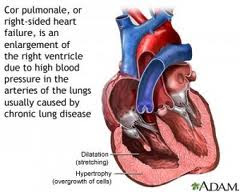Following disorders predispose to Cor pulmonale or right heart failure.
1. The disease of the pulmonary parenchyma.
a) Chronic Obstructive Pulmonary Disease
b) Diffuse Pulmonary interstitial fibrosis
c) Pneumoconiosis
d) Cystic Fibrosis
e) Bronchiectasis
2. Disease Of pulmonary vessels.
a) Recurrent pulmonary thromboembolism
b) Primary Pulmonary Hypertension
c) Extensive pulmonary arteritis (eg, in Wegener's granulomatosis)
e) Drug, toxin or radiation-induced vascular obstruction
f) Extensive pulmonary tumour and micro- embolism
3. Disorders Affecting Chest Movements.
a) Kyphoscoliosis
b) Marked Obesity (eg, Pickwickian Syndrome)
c) Neuromuscular disease
4. Others:
a) Metabolic acidosis
b) Hypoxemia
c) Chronic altitude sickness
e) Idiopathic alveolar hypo-ventilation.

Comments
Post a Comment
Post Your Reply and Give Your Opinion About the Post